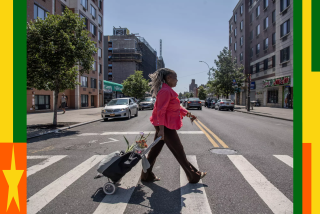Economy Role Perils Jamaica Racial Harmony
- Share via
KINGSTON, Jamaica — For many years, the slogan “out of many, one people” has been repeated here as a kind of official mantra, advertising a society that was said to have struck a balance of racial diversity and harmony.
In a country where people are described on the basis of such finely distinguished hues as “high brown,” “fair-skinned” and “Jamaican white,” the slogan also seemed to hold the promise that racial consciousness would not devolve into racial rivalry.
But with growing conviction, the notion of Jamaica and the smaller island nations of the English-speaking Caribbean as oases of racial coexistence and equal opportunity is being challenged as a glossy facade, concealing a more troublesome reality.
In the last 20 years, blacks have moved in large numbers into the professional classes as doctors, lawyers and managers. But the view is widely held that they are under-represented in ownership of key areas of the economy, such as tourism and distribution companies.
More than 90% of Jamaica’s 2.4 million people are black, and only 3% are white. Yet all but a few of the largest and most profitable businesses are owned or controlled by whites. Of the 41 companies listed on the Jamaica stock exchange in 1989, only four had black chairmen, according to The Record, a Kingston weekly that is one of the few publications that has addressed the racial issue.
Statistics on income distribution and race are scarce and out of date. But it came as little surprise to most Jamaicans when the delegation that accompanied black Prime Minister Michael Manley on an official visit to the United States this spring included four of the island’s captains of industry--all of them white.
In the 1950s and ‘60s, it was rare to see a black bank clerk, let alone a black manager in Jamaica. But in the 1970s, Manley’s rhetoric of black empowerment and his aggressively redistributive policies held out promise for the island’s black majority.
As droves of whites fled what they considered socialism’s advance in Jamaica, large numbers of blacks took their places in well-paid white-collar jobs. More blacks attended college, and before long blacks dominated virtually every profession and could be found in the managerial ranks of most major corporations.
Manley, reelected prime minister after spending most of the 1980s out of office, has toned down his ‘70s rhetoric of black empowerment in favor of support for a free-market economy.
But today, whites still control the largest private and public-sector firms in tourism, distribution and trading, oil refining and other major industries.
When the top job at Air Jamaica, the government-owned airlines, was vacant last year, The Record wrote: “I bet you the next Air Jamaica chairman is white. We don’t know who he is or whether the appointment has yet been made, but what we do know is that all the government and quasi-government companies involved in earning big foreign exchange have been historically reserved for whites.”
A short time later, the appointment was made. A white man got the job.
“Black people have come to dominate all sectors of life except for ownership of the corporate economy,” said Trevor Monroe, a government professor at the University of the West Indies. “But that’s a biggie.”
Mark Ricketts, the editor of The Record, said “you find an under-representation in the corridors of economic power by the vast majority” of black people.
Few here would disagree with that assessment. But the reasons for the imbalance of race and economic clout are the subject of a touchy debate, rarely public.
Neither Ricketts nor any of a group of mostly leftist intellectuals who share his view suggests that overt racism is to blame. Nor do many people consider race relations in Jamaica particularly tense. Blacks and whites mix easily at the Kingston Club, the Ligany Club and the Jamaica Club, formerly all-white bastions from Jamaica’s colonial past.
Many blacks contend that they have only themselves to blame for the persistent economic imbalance.
“There are many successful black businessmen in Jamaica but they have not made that quantum leap into the major leagues,” said Delroy Lindsay, director of the Private Sector Organization of Jamaica, a business association. “Us black people, we think small and that has limited us in the past. We are now starting to think bigger.”
Hector Bernard, a black publisher of a weekly newsletter, Insight, expressed a widely held view that Jamaican blacks are not predisposed toward business.
“Once they get a little money they want to have a good time, not build up the business,” Bernard said. “Black people as a class are not entrepreneurial. Some people just don’t have that knack.”
But many other black Jamaicans are less inclined to blame themselves. Carl Stone, the chairman of the government studies department at the University of the West Indies, said black entrepreneurs often are denied access to start-up capital by whites who control Jamaica’s banks.
“They deny blacks loans to keep out competition,” said Stone.
Ricketts said the shortage of prominent black businessmen is self-perpetuating, denying role models for younger blacks. “I go into schools to lecture and I say, ‘Name me 20 big businessmen in Jamaica.’ They can’t name one black! That has a debilitating effect on what young blacks see as their economic options.”
Ricketts and some others say blacks’ economic mobility is slowing as Jamaica’s foreign-debt burden--one of the largest on a per-capita basis in the world--is lowering living standards and real wages for the middle class.
One effect of the deteriorating economy has been emigration. Some 50,000 Jamaicans--about 2% of the population--leave the island each year, including more than half of the graduates of the University of the West Indies, the largest university. Nearly all of the emigrants are black.
That outflow of blacks is widely interpreted as a reflection of dwindling economic opportunity.
There is no sign that the issue will dominate the island’s politics anytime soon. In national elections last year, race was not an issue. “It’s not part of anyone’s political interest to raise the issue because no one can do much about it,” said a diplomat.
But some think it is only a matter of time before Jamaica’s economic squeeze forces racial discrepancies into the public debate.
“Many educated blacks are not going to be able to fulfill their legitimate ambitions--to own a house or a decent motor car,” said Monroe, the University of the West Indies professor. “And that’ll bring articulate blacks into putting the issue on the agenda.”
More to Read
Sign up for Essential California
The most important California stories and recommendations in your inbox every morning.
You may occasionally receive promotional content from the Los Angeles Times.













